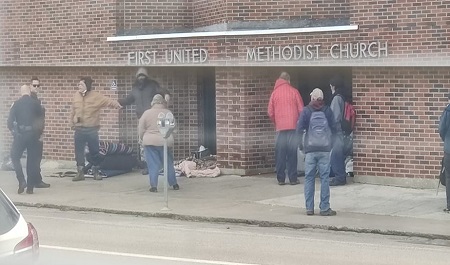Editors note – The following is the text of comments made during public comment at the 2/15/22 Great Falls City Commission meeting by a local citizen who lives in the same neighborhood as the First United Methodist Church.
“I’m a lifelong resident of Great Falls, MT. I grew up attending its schools, I graduated from Great Falls High, and I became a public school teacher myself. I’m also an ordained minister in my church. Two years ago, my wife and I bought our first house. It is a very modest home and we love it, but unfortunately for us it is located near the First United Methodist Church downtown.
The Methodist Church Homeless Encampment, for those of you who don’t have to live near it, is a living nightmare—especially after dark.
You will often find addicts there sleeping off drugs or alcohol, but also people shooting up, passing around bottles of booze, fighting, and screaming at the tops of their lungs at all hours of the night. My neighbors and I have called the police on the Encampment many times.
I’ve yet to witness a single arrest, or even heard of one being made. Because of this, the Methodist Encampment is a zone where disturbing the peace, public intoxication, and drug use have been essentially legalized. Thus, the encampment continues to attract many addicts and the mentally unstable.
We knew we weren’t moving into a wealthy neighborhood, but we had no idea we’d be living near an open-air homeless encampment. As residents of the neighborhood, we were never consulted about Reverend Wakeley’s decision to do this. None of us were ever asked by the church if this encampment was okay.
When we initially expressed our concerns about the encampment going unmonitored, we were informed that Reverend Wakeley expected us to act as his church’s surveillance crew, and to call him personally any time we witnessed illegal activity taking place. That way he could assess whether or not to trespass anyone off the property. So not only were we never asked about the encampment, the task of monitoring it got outsourced to us while the Reverend and the members of his congregation retired to their safe, quiet neighborhoods at night.
For the past year we have been forced to live with the consequences of the encampment, which means vagrants and drug addicts wandering up and down our streets at all hours of the day and night, often trespassing through our back yards, and stealing our property for drug money.
My wife and I chose to live in Great Falls because we thought it would be a safe place to raise our future children. After what we’ve been through dealing with men drunkenly stumbling to and from the Encampment, I would be concerned even letting a child play in my back yard.
As part of my calling as an ordained minister, I’ve spent much of my life working with the homeless and in addiction recovery. I spent two years volunteering my time at churches, soup kitchens, homeless shelters, and drug detox programs in some of the most impoverished neighborhoods in New York City (the South Bronx and Harlem, among others). I also spent several years as the head teacher of a federal juvenile detention and drug rehabilitation facility, working with incarcerated youths who had committed federal crimes—many of them from Montana, and many of them drug-related.
I have nothing but love for the homeless and for those afflicted by the evils of drugs and addiction. But I firmly believe that the Methodist church’s current approach does far more harm than help.
This church and others like it are run by compassionate people who do not lack empathy, but who do lack life experience and a firm grasp on the reality of the situation for people like me who actually have to live in this neighborhood.
People may ask “What would Jesus do in this situation?” I can tell you: Jesus would heal these people of their pain, their mental health problems, and their addictions. And He still will, and is waiting with open arms to do so. But the so-called “progressive” view, that people have a right to sleep on the sidewalk, is not only legally devoid of any merit but is inhumane, indecent and dangerous. It is also immoral and deeply un-Christian.
Ask yourself why the church doesn’t open its doors to these people, instead encouraging them to sleep on concrete in sub-zero weather. I think the answer is obvious.
These people need help. The best thing we can do for them is hold them accountable and point them to the MANY mental health, housing, and addiction recovery resources available, NOT enable their destructive behavior by giving them a consequence-free zone that makes it easier for them to keep using.
This encampment solves nothing, helps no one, and exacerbates problems we already face. Such a disaster would never be allowed to operate in Fox Farm or Prospect Heights. It should not be allowed in our neighborhood just because our incomes are lower.
I urge Reverend Wakeley or the city to please shut it down and start treating our brothers and sisters like human beings, not exploiting their anguish and suffering as some kind of marketing campaign for their personal projects.
Sincerely, Giordano Lahaderne”


